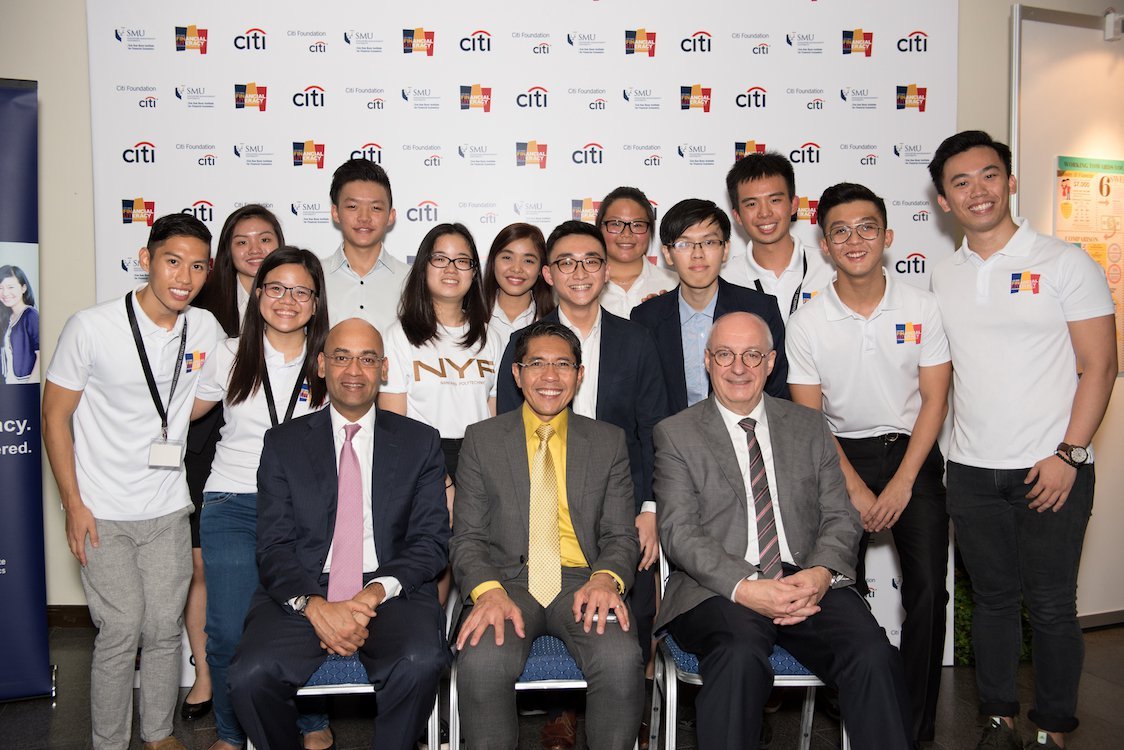
[Feature photo: Citi-SMU Financial Literacy programme student trainers with Head of ASEAN and CEO at Citi Singapore Mr Amol Gupte; Guest-of-honour Dr Mohamad Maliki Bin Osman, Mayor of South East District, Senior Minister of State, Ministry of Defence and Ministry of Foreign Affairs; and SMU President Prof Arnoud De Meyer]
Rapid technological and social change are making the personal finance landscape ever more complicated and increasing the importance of financial literacy for young adults, according to experts speaking at the 4th Citi-SMU Financial Literacy Symposium.
“We do think that the education system that we have today really trains you in a lot of deep knowledge in whatever your passion is, be it arts or sciences. But it doesn’t really equip you in something very fundamental that all of us have to deal with for the rest of our lives, which is how do we deal with our financials?” said Amol Gupte, Head of ASEAN and CEO of Citi Singapore.
The advent of cashless transactions and mobile payments, combined with the ubiquity of advertising and peer pressure on social media make it easier than ever to spend money but harder to manage it.

Mr Amol Gupte, Head of ASEAN and CEO of Citi Singapore (Left) and SMU President Prof Arnoud De Meyer (Right)
“Financial literacy today is no longer a luxury but a necessity,” Professor Arnoud De Meyer, President of SMU, told the event. “This is especially so given Singapore’s drive to be a smart nation. Technology has enabled individuals to make a spending transaction in an instant. One no longer has to reach for your wallet, pay in cash and receive change. You just flash a credit card on a machine, or your phone against a machine, and it is done.”
For the past six years, SMU and Citi have been working together on a programme to empower students to train their peers and other young people in financial literacy. So far, the initiative has trained 260 student trainers, who have worked with more than 14,000 young adults. (Read also: “Putting the Fun Back in to Finances”)
Howard Thomas, Professor of Strategic Management at SMU, said that dramatic changes in the structure of the workforce and the nature of employment mean that understanding personal finances is important from an early stage.

SMU Professor Howard Thomas
Professor Thomas said that the rapid pace of social and technological change means that partnerships between educational institutions and financial services companies—like the one between Citi and SMU—will be ever more relevant, with banks able to advise from the cutting edge of financial and technological innovation. However, he adds, there is also an important social component.
“In other words, you need friends, you need mentors, you need people to go and talk to who may, in fact, themselves have had experience of getting loans and so on and so forth,” he said. “The Citi partnership with SMU is part of a tripartite partnership in my view, which is the educational institution; the financial institution, which brings in technology more and more to financial instruments and the ways of doing things; but also, some trusted people that you work with.”

SMU alumnus, Mark Cheng (left)
Editor of MoneySmart.sg—and SMU alumnus—Mark Cheng said that a combination of unrealistic expectations fuelled by social media, and misconceptions about what financial management entails, means that young people can be resistant to learning more about personal finance.
“On a daily basis, you open up your Instagram and you see someone eating at some fancy-pants restaurant, and it creates a certain desire. You might not recognise it at first, but one of the first things that financial literacy does is it puts things in perspective. It helps you to be content knowing that there is a plan,” Cheng said.
“I think one of the traps that stops people from starting is not the lack of information… but [the feeling] that if I sort my finances out it’s going to be a life of misery—every day eat bread, not hang out with my friends. I’ll walk home instead of getting the bus. That’s not really true. The truth is that everything sits somewhere in the middle. And when you get to that point, you are able to have a balance of what is necessary, both from a spending and a saving point of view.”


